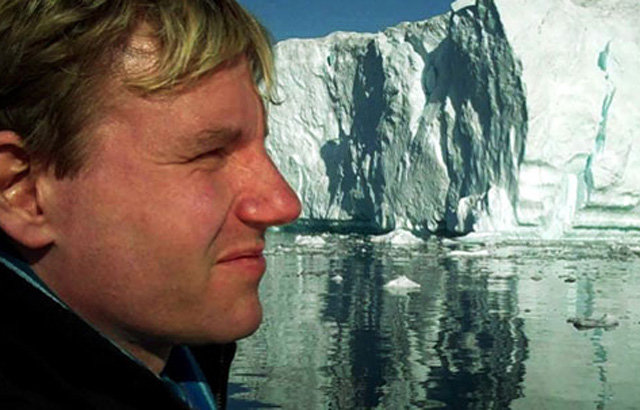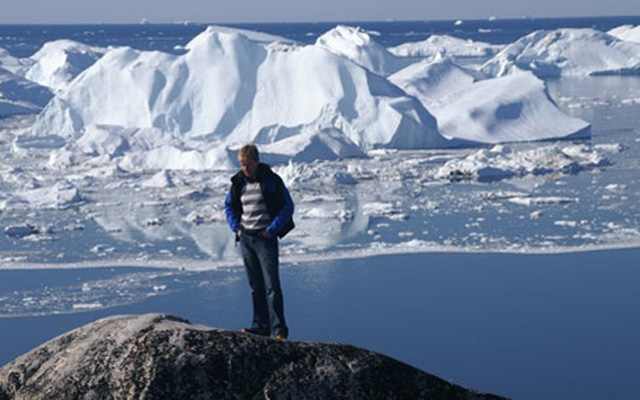CHICAGO – Patrick McDonald of HollywoodChicago.com appears on “The Morning Mess” with Dan Baker on WBGR-FM (Monroe, Wisconsin) on March 21st, 2024, reviewing the new streaming series “Manhunt” – based on the bestseller by James L. Swanson – currently streaming on Apple TV+.
Interview: Controversial Bjorn Lomborg Wants Us to ‘Cool It’
CHICAGO – The subject of global warming is not going away, both from an environmental standpoint and as a debate. The argument that crystallized with Al Gore’s “An Inconvenient Truth” has effected politics, science and the thoughts of all world citizens. Academic Bjorn Lomborg contributes his point of view in the new documentary, “Cool It.”
Lomborg is a controversial figure in this debate. His book, “The Skeptical Environmentalist,” was a screed that contended that while global warming and climate change are a threat, it is neither the sky-is-falling rationalization on the Al Gore side, nor deserves the blithe dismissal of climate change deniers. Lomborg wants to approach the problem through a different lens, one he asserts is more centrist.
 Photo Credit: 1019 Entertainment |
Given this approach, Lomborg has received more than his fair share of detractors. He makes this film to reach more people regarding his assertions, and seeks to bring the debate to a new set of standards.
HollywoodChicago sat down with Bjorn Lomborg last month, as he came to Chicago to promote “Cool It!,” which opens here on November 12th. The Skeptical Environmentalist shared his views regarding the film and the controversy that surrounds him.
HollywoodChicago.com: Why did you adapt your point of view from the books that you have written into a film version?
Bjorn Lomborg: You write a book, and if you’re lucky maybe a couple of hundred thousand people will read you. Certainly one of my big problems is that most people haven’t read what I say and have read what other people have said and the nasty things they write about me. The movie was a way to have a conversation like we’re having now. To talk about how we’ll deal with global warming. Obviously I’d like to change how I’m perceived as well, but honestly this is about getting the climate discussion going,
HollywoodChicago: But doesn’t your point of view regarding climate change also help fuel the side that denies it?
Lomborg: It’s inevitable that if you put arguments into the public sphere that people are going to take them apart. I’ve been called a denier, or since I’m counter to what Al Gore says, then I’m just a Republican. But if I say we need to spend money on climate change research, then I’m just a Democrat. That is exactly a testament to the unproductive nature of the conversation, if you only have those two extreme points. In reality what I’m trying to do is to be in the smart center. My success criteria for the film would also be if we end up having a conversation where we start saying, ‘yeah this is a problem, but it’s not the end of world. How do we fix it?’ Lots of people are going to come up with smart solutions, and then we’re all part of a much more constructive way of thinking.
HollywoodChicago: So was your film a response to Al Gore’s ‘An Inconvenient Truth’?
Lomiborg: I look at it more as a moving on than as a response. Al Gore made us realize that global warming is real, I think that is great. I think he also scared the pants off of many people, which I think was unhelpful. Fear makes us pick bad solutions. So this was about dismantling the unnecessary fear part. Realizing still it’s a problem that needs to be fixed, then moving on to a solution. I hope it’s a post-Al Gore rather than an anti-Al Gore.
HollywoodChicago: Your film speaks about commerce and energy in very sensible terms, as in how alternative energies are not cheap enough yet to compete with oil and coal. Is it possible that these very wealthy and influential industries can prevent alternative energies from competing against them? Like ‘who killed the electric car?’ How does the money you need for geo-engineering differ from the desires of very powerful people who want to squelch it?
Lomborg: You have to remember that most companies that are selling energy. It might be problem for Saudi Arabia, because most of their stake is in oil, but actually think that most of the energy companies, if there were a cheaper energy supply, they would adopt it.
The electric car, for example, is a complicated issue because it requires a whole separate infrastructure. You can’t have an electric car without places to refuel, so that became a decision of sticking with the oil standard. The main blockage to it is that it’s incredibly costly still. The fundamental problem is cost.
 Photo Credit: 1019 Entertainment |
HollywoodChicago: Since you go against the status quo, you’ve been subject to media scrutiny. During the post production process for this film, what was the biggest challenge of getting your message to the people, and what was the most rewarding part of it?
Lomborg: There are a lot of people who want to tear this apart, but there are more people, I’m finding, that want to get to a smart solution. There is a vast majority in the middle of the spectrum that feels uncomfortable about it, as in why aren’t we doing something about it, but it’s not their biggest life issue. In many respects, this is the type of film that once you hear the message, people will say that it makes a lot of sense.
When I go out to give talks, invariably there will be someone who comes up afterward to me and says, ‘I thought I would hate you, but this actually makes a lot of sense.’ In a lot of ways, the biggest challenge for me have been the people who have heard about me from someone who didn’t like me, and not from me. And what this film does is make it possible for people to hear what I say, and most people’s reaction is ‘this sounds pretty smart.’ That is the most rewarding part.
HollywoodChicago: You spoke earlier of fear being part of this debate, does this obsession or hysteria serve any purpose or is it always counter-productive in your opinion, and how do you slow that fear down to make what you’re saying work?
Lomborg: As an academic I would always say that it is unacceptable and it is unlikely that it’s not going to backfire in the long run. If you scare people and then say we only said that to scare you, it’s hard to imagine you would treat those people with the same respect later on. I actually think the reason we see a lot of people turning off to the issue is exactly because they got so scared.
HollywoodChicago: You make a cogent argument in your film for alternative methods of stemming global warming, the so-called ‘geo-engineering.’ What is the status of world opinion on these alternative means?
Lomborg: I think people are coming around to realizing that we need to also look at this solution. This is similar to the adaptation discussion of the 1990s, even when environmentalists were saying we shouldn’t talk about adaptation because then we won’t cut carbon emissions. I believe it’s immoral not to talk about how to adapt because a lot of people would be affected and we have to talk about how we’ll adapt. And I think it’s immoral how we could potentially avoid some of the dramatic impact of climate change at a very low cost. Don’t we at least want to look at geo-engineering?
It’s similar to saying that if you install seat belts and air bags in cars that people will drive recklessly. Nobody makes the argument that we shouldn’t put them in, because people will be reckless. So more people are realizing that geo-engineering should be part of the mix.
HollywoodChicago: How is science left out of the climate change debate? How do you explain it to people who are just thinking politically?
Lomborg: The simple answer is that the solution for the last 18 years has been to make fossil fuel so expensive that nobody would want to use it anymore. That’s a politcal non-starter but it also economically very inefficient. If you try to do that it costs a lot but does little good. The European Union is a perfect example of that, they’re going to spend 250 billion a year for the rest of the century to reduce the temperature by one-tenth of a degree Fahrenheit. So instead of making fossil fuels so expensive that no one wants it, we need to make green energy so cheap that everybody wants it.
HollywoodChicago: Is the current Obama Administration on board with any of the ideas that you’re expressing?
Lomborg: At the Nobel conference, we talked to them. I think they and many other world leaders feel as if they’ve painted themselves into a corner and they are looking for a way out. This could be one way. They could say they are taking it seriously, but not to keep doing things that don’t work. So let’s instead invest more in research and development. It’s cheaper, it’s more effective, and oh by the way it will probably work a lot more.
 | By PATRICK McDONALD |


